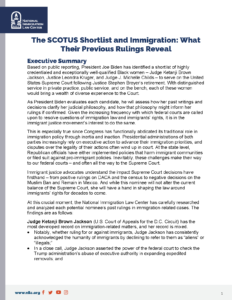The SCOTUS Shortlist and Immigration:
What Their Previous Rulings Reveal
National Immigration Law Center
 Executive Summary
Executive Summary
Based on public reporting, President Joe Biden has identified a shortlist of highly credentialed and exceptionally well-qualified Black women – Judge Ketanji Brown Jackson, Justice Leondra Kruger, and Judge J. Michelle Childs – to serve on the United States Supreme Court following Justice Stephen Breyer’s retirement. With distinguished service in private practice, public service, and on the bench, each of these women would bring a wealth of diverse experience to the Court.
As President Biden evaluates each candidate, he will assess how her past writings and decisions clarify her judicial philosophy, and how that philosophy might inform her rulings if confirmed. Given the increasing frequency with which federal courts are called upon to resolve questions of immigration law and immigrants’ rights, it is in the immigrant justice movement’s interest to do the same.
This is especially true since Congress has functionally abdicated its traditional role in immigration policy through inertia and inaction. Presidential administrations of both parties increasingly rely on executive action to advance their immigration priorities, and disputes over the legality of their actions often wind up in court. At the state level, Republican officials have either implemented policies that harm immigrant communities or filed suit against pro-immigrant policies. Inevitably, these challenges make their way to our federal courts – and often all the way to the Supreme Court.
Immigrant justice advocates understand the impact Supreme Court decisions have firsthand – from positive rulings on DACA and the census to negative decisions on the Muslim Ban and Remain in Mexico. And while this nominee will not alter the current balance of the Supreme Court, she will have a hand in shaping the law around immigrants’ rights for decades to come.
At this crucial moment, the National Immigration Law Center has carefully researched and analyzed each potential nominee’s past rulings in immigration-related cases. The findings are as follows:
Judge Ketanji Brown Jackson (U.S. Court of Appeals for the D.C. Circuit) has the most developed record on immigration-related matters, and her record is mixed.
- Notably, whether ruling for or against immigrants, Judge Jackson has consistently acknowledged the humanity of immigrants by declining to refer to them as “aliens” or “illegals;”
- In a close call, Judge Jackson asserted the power of the federal court to check the Trump administration’s abuse of executive authority in expanding expedited removals; and
- After the Trump administration changed documents so that they incorrectly stated asylum law, Judge Jackson held the Trump administration accountable by requiring it to provide relief for those harmed by the administration misstating the law.
- However, Judge Jackson rejected a challenge to two Trump-era immigration programs that improperly prevented asylum seekers from consulting with a lawyer;
- Judge Jackson denied a challenge to Trump’s border wall, holding that the challenged statutes were exempt from judicial review.
On the U.S. District Court for the District of Columbia, Judge Jackson was bound by circuit and Supreme Court precedent. As a Justice, she would be setting precedent. If she is the nominee, a deeper inquiry into her record on immigration related issues will be required.
Judge J. Michelle Childs (District Court for the District of South Carolina) has only ruled on a few immigration-related cases, and the most substantive of those decisions raises concerns about her deference to executive power.
- Judge Childs deferred to a federal agency that had failed to evaluate the work authorization for an undocumented immigrant who was the victim of a crime. By failing to intervene, she effectively permitted the agency to either delay or never issue the authorization.
- However, Judge Childs allowed a lawsuit from a foreign-born doctor to proceed in which he claimed his employer was illegally changing his job requirements and threatening to terminate his work visa if he did not comply.
- If Judge Childs is selected, her record warrants a deeper examination of her rulings around workers’ and immigrants’ rights, as well as her jurisprudence around the degree of deference afforded to federal agencies.
As a member of the California Supreme Court, Justice Leondra Kruger’s relevant opinions generally concern the intersection of state law and immigration and demonstrate an awareness of the challenges immigrants face in asserting their rights.
- Justice Kruger authored a unanimous decision allowing an undocumented immigrant to withdraw a guilty plea after he was merely advised that his plea might result in his removal from the country. Justice Kruger wrote this was inadequate to satisfy the legal requirement that immigrants be advised of immigration consequences of certain convictions.
- In another unanimous decision, Justice Kruger held that a father who had abandoned his daughter at birth was not an essential party in her custody case. This finding allowed the child’s special immigrant juvenile case to move forward.
With a thinner record on immigration issues and fewer rulings implicating federal law, the nomination of Justice Kruger should prompt further inquiry into how she approaches administrative and constitutional law.





